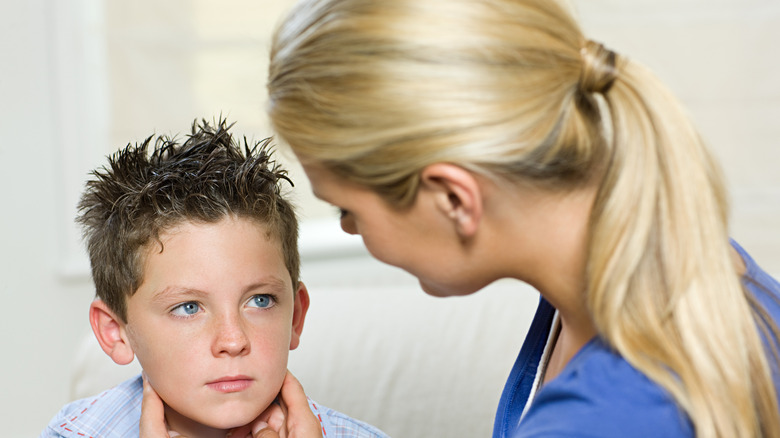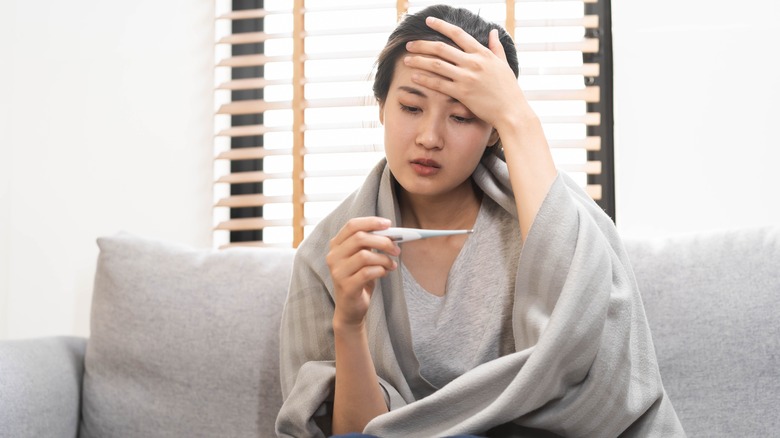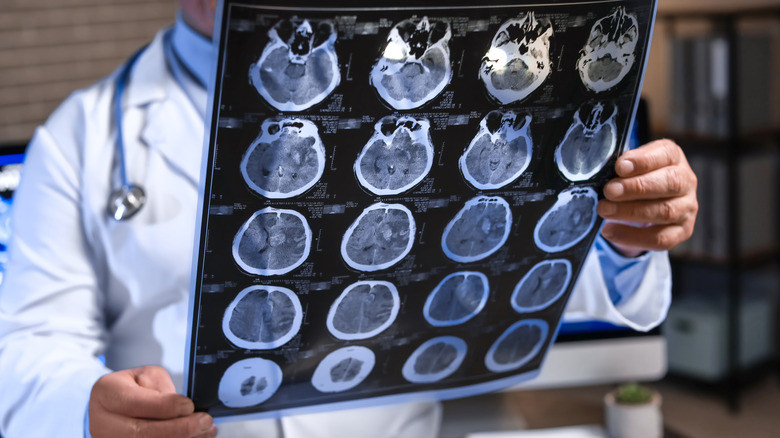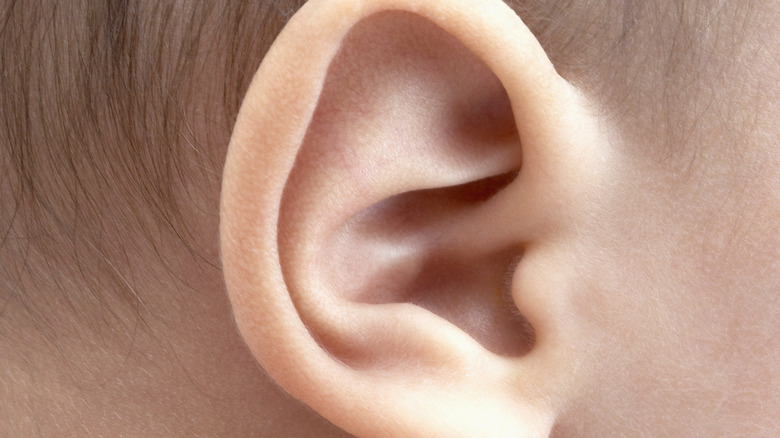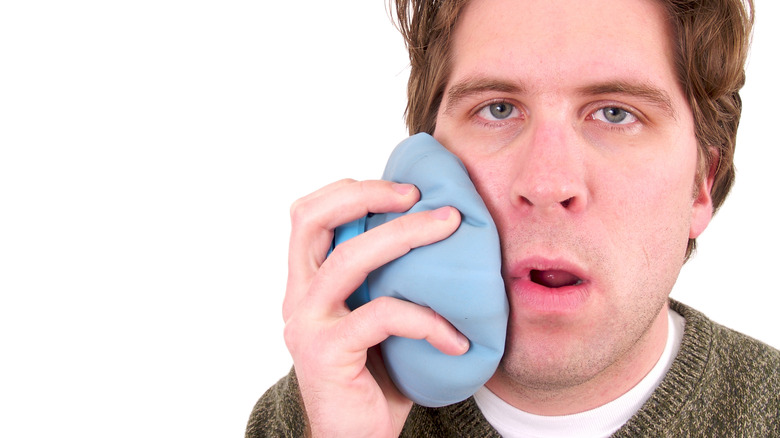Symptoms Of Mumps Explained
Your older friends and relatives likely remember mumps as a nearly inevitable childhood disease. Caused by a highly contagious virus, according to the Centers for Disease Control and Prevention (CDC), it spreads through respiratory droplets, meaning you could easily catch the disease just by being in the same room as an infected person — even an asymptomatic one. And while most cases are mild, resulting in a couple of weeks of puffiness, fever, and fatigue, serious complications from mumps are possible: According to the CDC, mumps was the third most common cause of hospitalization among soldiers during World War I.
Fortunately, the introduction of mumps vaccines in the late 1960s and early 1970s has made mumps mostly a thing of the past — the implementation of a two-dose vaccination program in the U.S. has reduced the number of reported cases in the country by 99%. However, cases have increased since 2006, even among fully vaccinated people. And while mumps is far from the threat it used to be, it would be wise to be aware of its symptoms and how to handle them, should you or someone close to you be affected.
Fever and body aches are common
Like many viruses, mumps frequently causes fevers and body aches in infected people, per the New York State Department of Health. Typically, these symptoms will be among the first you will experience when infected (per the CDC), emerging around 16-18 days after exposure to the virus (though the incubation period can be as short as 12 days or as long as 25). And as is the case with other viral or bacterial infections, your fever is a sign that your immune system is attempting to fend off the disease: According to Scientific American, your immune system ramps up your body temperature to prevent viruses and bacteria, which are typically temperature-sensitive, from replicating.
Your immune system is also the reason you may feel achy all over if you get mumps. UCLA Health explains that when you're infected by a pathogen such as the mumps virus, your immune system releases extra white blood cells to fight off the invaders. While this means your body is doing its job and trying to keep you safe, it also results in inflammation, which can cause body aches. UCLA Health recommends a few tips to ease your discomfort as you recover: Drink lots of liquids, rest, and use heating pads or take warm baths or showers (if you're not experiencing a high fever) to soothe aching muscles.
Here's why mumps gives you chipmunk cheeks
The best-known symptom of mumps — as fans of vintage cartoons and movies know — are swollen, puffy cheeks, giving infected people a round-faced, jowly look. This swelling happens, according to the Mayo Clinic, because the mumps virus primarily targets the salivary glands, which are located in your cheeks, in front of your ears and along the sides of your jaw. The virus causes inflammation of the salivary glands, which causes them to swell and become tender and sore. This swelling is what makes your entire face look puffy.
No targeted treatment for mumps exists, according to the New York State Department of Health, so your only option is to ride out the disease and manage its symptoms while allowing the swelling to abate on its own. To ease any pain from the swelling, over-the-counter pain relievers such as ibuprofen can be helpful. Per the Cleveland Clinic, hot packs or ice packs (whichever feels best to you) can also help soothe inflamed cheeks, and avoiding acidic foods that stimulate saliva production will give your embattled salivary glands a needed break. According to the Mayo Clinic, however, conditions other than mumps — such as blocked salivary glands or other viruses — can cause similar symptoms, so consult your physician if you're in doubt.
You may feel unusually tired
Fatigue is a common symptom of mumps — if you catch the virus, you may feel worn out and sleepy even if you're just sitting around and not doing anything especially tiring, according to Johns Hopkins Medicine. And mumps isn't unique in making infected people feel wiped out. As Penn Medicine News explains, this is a common symptom of many diseases and is, in fact, another one of the body's defense mechanisms. Infections such as mump stress the body, which reacts by triggering sleepiness to encourage rest and recovery.
So what should you do if your case of mumps is making you too tired to do anything but sleep? Your best plan of action is to do exactly what your body is telling you to do: Take plenty of naps to give your body the energy reserves it needs to fight off the disease. "Sleep is vitally important in helping both people and animals to recover during sickness," neurologist and researcher Dr. David M. Raizen told Penn Medicine News.
A loss of appetite is common
If you get the mumps, it's likely you'll notice a diminished appetite. There are a couple of reasons why mumps makes the prospect of eating less appealing. First, according to Boston.com, is that infections in general trigger the immune system to release a range of hormones intended to help your body mount its defenses — and among these are hormones that suppress the appetite. How does this help fight off infection? As Boston.com notes, the goal of this strategy is to reduce glucose levels in the bloodstream, thus depriving infectious pathogens of a nutritional source.
A second reason you may experience a reduced appetite is specific to mumps: Trying to chew and swallow with infected, inflamed cheeks (a common feature of mumps) can be a literal pain. And the fact that a sore throat is another common symptom of mumps, per the Cleveland Clinic, will also put a damper on your mealtimes. Still, you need some nutrition even when ill, so the Cleveland Clinic offers a few suggestions for keeping discomfort to a minimum while eating: Stick to soft foods that are easy to chew, drink lots of liquids, and suck on ice pops to soothe your throat if it's sore.
Brain inflammation is a rare but dangerous complication
While most cases of mumps are fairly mild and resolve themselves in about two weeks, according to the CDC. In some cases, though, the disease can escalate and infect areas of the body other than the salivary glands. Among the most potentially severe complications caused by mumps is inflammation of the brain (encephalitis) or brain and spinal membranes (meningitis). While both of these conditions can be mild, causing few or no symptoms and usually going away on their own (per the Mayo Clinic), they can be potentially life threatening. Thus, it's a good idea to recognize their symptoms so you seek medical help should you or someone close to you get mumps.
If you're lucky, you might not even notice a mild case of encephalitis, since its symptoms — fever, body aches, and fatigue — pretty much overlap with typical symptoms of mumps. Mild cases of meningitis cause similar symptoms. However, you should be on the lookout for signs of more severe infection, such as severe headaches, a stiff neck, confusion, seizures, or loss of sensation in any body part, and seek medical help if you notice any of these.
Deafness is an uncommon complication
While mumps is typically milder in children than in adults (per Nationwide Children's), one of its potential complications is known to hit children especially hard: permanent hearing loss. According to an article in Auris Nasis Larynx, mumps is the leading cause of acquired sensorineural deafness in one ear among children. (Mumps-induced hearing loss almost always affects only one ear). And according to Reuters, mumps-induced hearing loss in children may be 20 times more common than previously thought: A study in Japan, based on a survey of over 7,500 pediatric mumps patients, found a .1% incidence of permanent, severe hearing loss in one ear. It's worth noting, however, that mumps vaccines are uncommon in Japan, and none of the affected children were vaccinated.
One reason mumps-induced deafness is so devastating is that it hits quickly and is irreversible (per Auris Nasis Larynx). It is thought to be caused by viral infection spreading to the cochlea and damaging the hairs in the inner ear responsible for transmitting the nerve impulses we interpret as sound to the brain, according to Arizona Hearing Specialists. Because these hairs cannot regenerate, any damage to them — and to hearing ability — is permanent.
Mumps can cause lower sperm counts, but infertility is rare
Here's a good talking point if you need to convince any men in your life to get a mumps vaccine: Mumps can also lower sperm counts, according to the UK's National Health Service (NHS). This is because in some cases, the mumps virus can target the testicles, a complication that typically occurs four to eight days after the onset of facial swelling. Typically, only one testicle will be affected, but the condition can be painful, resulting in swelling and soreness of the affected testicle.
While the condition will eventually subside, about half of affected males will come away with some shrinkage of the affected testicle, and about 10% will have a reduced sperm count. In addition, according to a review in the Journal of the Royal Society of Medicine, mumps-induced testicular infections can temporarily lower testosterone levels, though they'll return to normal after several months. Luckily, infertility in men as a result of mumps is uncommon, but the disease can lead to subfertility — all the more reason to avoid infection if at all possible.
In rare cases, mumps can cause pancreatitis
A less-common complication of mumps is pancreatitis, or inflammation of the pancreas (per Johns Hopkins Medicine). According to a case study in Clinical Case Reports International, mumps-induced pancreatitis is more likely to occur in adults than in children and is seen in about 4-8% of mumps cases. And in even rarer cases, mumps can manifest as pancreatitis without the characteristic facial swelling associated with the disease.
While some of the symptoms of mumps-induced pancreatitis overlap with general mumps symptoms such as fever, loss of appetite, and general unwellness, according to the NHS, telltale signs of pancreatitis include diarrhea, acute pain and tenderness in the center of the abdomen, and in rare cases, jaundice, including yellowing of the eyes. While the NHS notes that mumps-induced pancreatitis is typically mild and goes away on its own, those with more severe cases may need to be hospitalized and monitored to ensure the body is functioning safely while the pancreas heals.
These populations are most vulnerable to mumps complications
The impact of mumps can vary greatly from person to person, and the virus can be nearly asymptomatic in some people but deadly in others. Thus, while traditionally brushed off as a childhood disease, mumps should not be taken lightly. And depending on who you are, you may be more or less likely to contract mumps or experience complications if you do catch the virus.
According to Arkansas Department of Health, adults are more likely to experience serious complications from mumps than children. But older adults — those born before 1957 — are thought to be immune to the disease, since they likely already contracted mumps or otherwise developed natural immunity to it during the time when mumps was still endemic. Because the mumps virus is transmitted through respiratory droplets circulating in the air, those who live in or spend a lot of time in crowded settings (such as college campuses), are also more likely to contract the disease. And while people who have been vaccinated against mumps can still catch the disease (per the CDC), their cases will be milder with fewer complications, and mumps outbreaks tend to be shorter and smaller in highly vaccinated populations.
If you get mumps while pregnant, here's what to expect
If you're pregnant, you're probably extra cautious to protect yourself against infectious diseases, since you're now responsible for keeping your future child safe too. The good news is mumps is no cause for special concern: According to the CDC, mumps is no more severe in pregnant women than for those who are not pregnant, and little evidence points to any significant risk to fetal health from mumps.
While a few studies from the 1950s and 1960s suggested a correlation between gestational mumps and miscarriage, these findings could not be replicated. Subsequent studies found no correlation between mumps in pregnancy and low birth weight, nor between mumps and birth defects. However, the UK Health Security Agency noted an association between gestational mumps and respiratory distress during birth. Neither the CDC nor the UK Health Security Agency recommend any special precautions or treatments for pregnant women exposed to mumps, but the UK Health Security Agency advises again getting the mumps, measles, and rubella (MMR) compound vaccination — the typical vaccination against mumps — during pregnancy.
Here's how to treat your mumps symptoms
Unfortunately, according to the Arkansas Department of Health, there's no cure for the mumps — once you get it, you have no choice but to let it run its course. Fortunately, however, most cases are mild and their symptoms can be managed with the same over-the-counter pain relievers and home remedies used for other common ailments.
According to the Cleveland Clinic, non-aspirin pain relievers such as ibuprofen and acetaminophen can help ease aching muscles and swollen glands, as can your choice of hot or cold compresses. Drinking lots of fluids can also help your body heal. Johns Hopkins Medicine also recommends plenty of bed rest, especially during the first few days of your illness — and this will be an easy recommendation to follow, since the virus is likely to make you feel pretty wiped out. And it's important to remember that protecting those around us is as important as healing ourselves. While sick with a highly contagious disease such as mumps, stay home and keep your distance from others if at all possible.

